Paul Levinson's Blog: Levinson at Large, page 200
December 24, 2017
Love and Time Travel: aka Chronesthesia
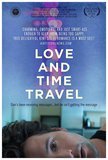 Love and Time Travel - aka and more aptly named Chronesthesia - is hardly about time travel, except in the slimmest and most metaphoric of senses. But it does take place in New Zealand, and it's free on Amazon Prime, and worth watching, if getting visions of the future in strange but endearing ways is to your liking.
Love and Time Travel - aka and more aptly named Chronesthesia - is hardly about time travel, except in the slimmest and most metaphoric of senses. But it does take place in New Zealand, and it's free on Amazon Prime, and worth watching, if getting visions of the future in strange but endearing ways is to your liking.Dan the lead character (well played by Hayden Weal, who wrote and directed the movie) does say to one of the several slightly-or-more deranged characters in the movie (who believes he's space traveler), "I don't space travel - I time travel." But what travels in this movie are not people but glimmerings of the future, written on window sills and coming to Dan in other ways.
There are some heart-warming stories woven into Chronesthesia, my favorite being Richard and Eve, long separated, now aged, and almost reunited due to Dan's visions and persistent sleuthing. But some good comes out of this, as Richard gets to know the son he never knew he and Eve had. Dan and Sophia (commandingly played by Michelle Ny from Top of the Lake) also offer an interesting story, with Sophia's commitment to Dan, despite his bizarre behavior, especially memorable and reassuring.
By the way, chronesthesia - the noun - means the ability of all humans to always have the past and the future in mind. Many anthologists see this as a defining characteristic of humanity, and I completely agree. Of course, thinking about the future, and seeing it in that way, is not quite the same by a long shot as seeing literal messages from the future, and I only wish Love and Time Travel had gone a little further in that time-traveling seeing-the-future direction.
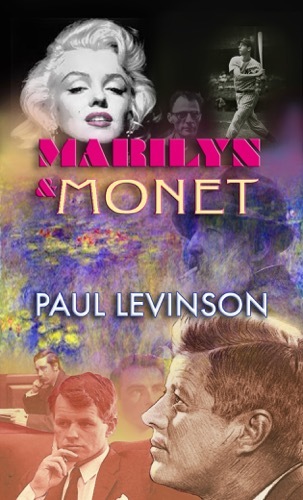
It started in the hot summer of 1960, when Marilyn Monroe walked off the set of The Misfits and began to hear a haunting song in her head, "Goodbye Norma Jean" ...

watch The Chronology Protection Case FREE on Amazon Prime

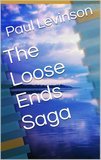

read time travel stories FREE on Amazon Prime
Paul Levinson's books ... Paul Levinson's music
Published on December 24, 2017 22:40
The Girlfriend Experience 2.13-14: One and One is Less than One
 The Girlfriend Experience just concluded it's oddly double season tonight on Starz.
The Girlfriend Experience just concluded it's oddly double season tonight on Starz.Erica and Anna end up both prone, but not together. Erica's on the floor of some kind of building, utterly distraught and drunk, her life falling apart, her last defense gone, as the FBI has a recording proving she was lying. Anna's on a bed on her back pretending to sleep, as a john takes off her high heels. You could say Erica has gotten her just desert, after what she did to Anna, and Anna's doing what she loves. But, still, it was sad to see.
Over in the Bria story we get, maybe, a better ending for her. But it's not what she imagined when she's at the side of the lake, her white outfit suitably soaked in blood. Because although she killed the bad guys, it's not at all clear what Ian and the authorities will now do to her. Still, unlike Erica, at least Bria has a fighting chance.
Bria's story was always stronger than Erica and Anna's, but even Bria's wasn't as good as the first season of The Girlfriend Experience. And two stories are not the kind of thing you can add together and say they're better than one, unless each or at least one of them is better than the one you're comparing them to. (Same for the performances of Anna Friel and Louisa Krause and Carmen Ejogo, which were all good, but not as good as Riley Keough's in the first season. But the comparison is also apples and oranges, because the season 2 acting had much less screen time than first.)
So, although I'd watch another season of The Girlfriend Experience, and admire the outrageous chances it takes and the style with which it shows us all of this, I'd recommend and hope that a third season returns to a single, more focused story.

It started in the hot summer of 1960, when Marilyn Monroe walked off the set of The Misfits and began to hear a haunting song in her head, "Goodbye Norma Jean" ...
Paul Levinson's books ... Paul Levinson's music
Published on December 24, 2017 19:50
A Promise of Time Travel: Just That, And A Bit More
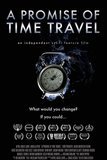 I decided to expand my time-travel short binging horizons with a feature-length time-travel movie - still on Amazon Prime, and free, as befits my cheapskate ways - a complete hour and 28 minutes, and A Promise of Time Travel.
I decided to expand my time-travel short binging horizons with a feature-length time-travel movie - still on Amazon Prime, and free, as befits my cheapskate ways - a complete hour and 28 minutes, and A Promise of Time Travel.And for most the movie, indeed, until the very end, it's just that: a clever, colorful, woman-works-in-a-bookstore kind of time travel story. This part works well enough, as Zelda - well played by April Grace Lowe (who doubles as the movie's producer) - not only reads intelligently about the metaphysics or philosophy of time travel (not the science), but gets drawn into some kind of time travel plot or scenario which is unclear to her as well as the audience. I should say here that I find this emphasis on theory not science very enjoyable, and consistent with of my own time travel fiction in novels and stories. Not only that, but the story preceding or being a prelude to time travel is also something I'm partial to, hence The Chronology Protection Case.
[spoilers ahead ... ]
But the promise is amply fulfilled at the end of A Promise of Time Travel, when Zelda and we learn that a kind of time travel has indeed taken place, but it's the projection of minds into bodies, not the actual transport of full human beings to the past. In this, A Promise has a kinship with Bonnie Rozanski's The Mindtraveler, one of the best time travel novels I've read in years. (See here for my brief review.)
There's an interesting romance that runs through A Promise - or a romance that runs through the story in an interesting way - and indeed turns out to be the engine that drives everything else that's going on. I'm glad I saw this movie - written and directed with style by Craig Jessen - and I'd recommend it to both devotees of the genre and the world at large.

watch The Chronology Protection Case FREE on Amazon Prime



read time travel stories FREE on Amazon Prime Paul Levinson's books ... Paul Levinson's music
Published on December 24, 2017 17:58
In the Hands of Time: Quiet Gem of a Time Travel Short
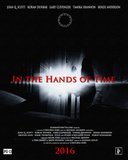 Continuing my end-of-year excursion into time-travel shorts on Amazon Prime, I today encountered In the Hands of Time, some 21 minutes from 2016.
Continuing my end-of-year excursion into time-travel shorts on Amazon Prime, I today encountered In the Hands of Time, some 21 minutes from 2016.This one's a quiet gem. An inventor and his wife just find out they're expecting a baby. He goes into his lab, fiddles with the device he's been working on, and is transported 40 years into the future. He's outside of his home. He knocks on the door, which his wife opens. She's glad to see him - but she's now 70 years old. Their challenge: how can they be together again at the same age?
Since this kind of time travel only works one way - instantly, 40 years into the future - their options are limited. But they give it a shot. And, of course, when you're in the hands of time, rather than your own volition, nothing works out as planned. Or perhaps the message is that we're always in the hands of time, even without time travel, and that's why so many good plans go awry.
There are basically two kinds of time travel stories (in movies, TV shows, and novels and short stories). In one type, like 12 Monkeys, the world itself is as stake. In the other type, like The Butterfly Effect, one or more personal lives are at stake. In the Hands of Time is a fine example of the latter.
Written and directed by Cheickna Kebe, well acted by everyone, especially Joan Q. Scott as the 70-year old wife. Don't wait 70 or even 40 years to see this!

watch The Chronology Protection Case FREE on Amazon Prime



read time travel stories FREE on Amazon Prime Paul Levinson's books ... Paul Levinson's music
Published on December 24, 2017 14:10
December 23, 2017
Jacob's Paradox: Between Genesis and Milton
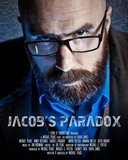 I figured I would expand the purview of my year-end plunge into time-travel feature movies and TV series on Netflix to time-travel shorts on Amazon Prime (Netflix doesn't have many if any time-travel shorts). First up is Jacob's Paradox from 2015, a 36-minute narrative, written, directed, and starring Michael Peake (this is a common configuration in shorts - Jay Kensinger wrote, directed, and starred in The Chronology Protection Case, based on my novelette of the same name).
I figured I would expand the purview of my year-end plunge into time-travel feature movies and TV series on Netflix to time-travel shorts on Amazon Prime (Netflix doesn't have many if any time-travel shorts). First up is Jacob's Paradox from 2015, a 36-minute narrative, written, directed, and starring Michael Peake (this is a common configuration in shorts - Jay Kensinger wrote, directed, and starred in The Chronology Protection Case, based on my novelette of the same name).The name Jacob's Paradox is reminiscent of the Biblical Jacob's Ladder. But when you're dealing with time travel and paradox, you often wind up not climbing up to heaven as the Biblical Jacob did, but falling into hell, as the Jacob in this short does. And though I've always agreed with Milton's Lucifer that it's better to reign in Hell than serve in Heaven, Jacob doesn't even get to do that in Jacob's Paradox.
This Jacob is a professor who lectures his physics class on the grandfather paradox - if you traveled to the past and killed your grandfather before he sired your mother or father, how would you have been able to travel to the past in the first place, since you wouldn't have existed. Professor Jacob provides two "solutions" - something will stop you from killing grandpa, or, a new alternate reality will come into being with no you, but since the you who traveled to the past comes from the first reality, the paradox is averted.
So informed, the audience is set for what the thrust of the movie will be: Jacob is going to travel a little bit into the past to save his wife, who was murdered by an intruder in their home when Jacob wasn't there. Jacob's plan is to travel back to the past and indeed be there, and stop the killer,
I won't spoil the ending for you, except to say it's excellent and O'Henry-esque, with good performances by Peake as Jacob and Mindy Heithaus as as philosophy professor. Recommended viewing, with room for a sequel.

watch The Chronology Protection Case FREE on Amazon Prime

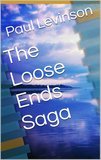

read time travel stories FREE on Amazon Prime Paul Levinson's books ... Paul Levinson's music
Published on December 23, 2017 21:48
Peaky Blinders Season 4: Best So Far
 The six episodes of Peaky Blinders season 4, which my wife and I just finished watching on Netflix, pack as much or more punch than any of the previous seasons. I'd say Peaky Blinders now ranks right up there with the Godfather trilogy as creme-de-la-creme gangster family stories. My wife agrees, and points out that Peaky Blinders is better than Boardwalk Empire. Although I liked a lot of Boardwalk Empire, I've got to agree, especially with this powerful, unforgettable fourth season, full of twists and turns and surprises, well motivated in retrospect.
The six episodes of Peaky Blinders season 4, which my wife and I just finished watching on Netflix, pack as much or more punch than any of the previous seasons. I'd say Peaky Blinders now ranks right up there with the Godfather trilogy as creme-de-la-creme gangster family stories. My wife agrees, and points out that Peaky Blinders is better than Boardwalk Empire. Although I liked a lot of Boardwalk Empire, I've got to agree, especially with this powerful, unforgettable fourth season, full of twists and turns and surprises, well motivated in retrospect.[Spoilers ahead ....]
I got at least two of them. I knew Polly (perfectly played as always by Helen McCrory) could never betray Tommy, regardless of how legitimate her grievance against him for almost (nick of time almost) getting her and the rest of the Shelby's hung. I also thought at first that Arthur wasn't dead - why else would the narrative make such a big deal when Tommy prevented the bad guy from putting a bullet in Arthur's head, and strangling Arthur - and therefore I wasn't totally shocked when Arthur later showed up alive and well. But it was still great television seeing these two stories play out.
I very much liked the Tommy as MP ending. The government played a subtle but important role throughout this season, starting with Tommy getting the Shelbys out of the noose and through to the police showing up and stopping the duel between Tommy and Luca (suitably vivid villain by Adrien Brody). So it made sense that Tommy would see his next move as inside rather than outside the government.
Arthur had his best season, I thought. He did his job and saved Tommy's life at that boxing match. I was sorry to see Solomons go, but he got what he deserved, almost getting Tommy - i.e., killing him - after he distracted Tommy almost a second too long with his endless talking. This was the way Solomons lived and succeeded (until now) in his life, talking his opponents if not literally to death, at least into some kind of submission. Tommy's quick reflexes saved him from Solomons' surprise gun. Peerless acting by Tom Hardy as Solomons, and, as always, top of the line from Cillian Murphy as Tommy and Paul Anderson as Arthur.
I liked Gold (another memorable performance by Game of Throne's Aidan Gillen) and his son, and hope they have a role in the next season. And it was good to see another baby - Tommy and Lizzie's - in the family.
The cinematography was outstanding - crystal clear, colorful, and wide - as it was from the very first episode of the very first season. Peaky Blinders now, in my view, is the undisputed best original series yet to appear on Netflix, where the competition is merciless.
See also Peaky Blinders: Peak Television ... Peaky Blinders Season 3: Still Peak

Paul Levinson's books ... Paul Levinson's music
Published on December 23, 2017 18:48
Smart Phones and Time Travel
I saw and reviewed the 2011 movie The Man from the Future (Brazilian with English subtitles) yesterday, and noted that I liked the time traveler's use of his smartphone (he traveled back from 2011) to demonstrate to the people in 1991 that he was a time traveler. He points out that his phone, which is a smaller version of the cellphones and mobile phones they already knew and were using, was also a computer, could take photographs, etc. This familiarity with a mobile device made it easier for the people in 1991 to accept that the time traveler came from twenty years in the future - had he shown them something totally alien to their culture, it would have been a much steeper climb for them to make any sense of it and him.
But it occurred to me that a smartphone could be a useful passport to the past much further back than twenty years. People as far back as the late 1870s knew about telephones, and in the 1840s about cameras. Certainly most people in 1845 could have related to a small device that took pictures, and would have been intrigued by the time traveler's claim that it and he came from the future.
Of course, one problem with smartphones going through time is there would be no service, neither data nor wifi, in the past. But that's ok. The camera function would still work. And for jaunts even further back in the past, before there were photographs, phone apps like the flashlight and mirror would be impressive. And the smallness of the smartphone, a great advantage to us here in the present, would be a boon to the time traveler, being effortless to carry in a pocket.
Batteries would be a more serious limitation, and it's interesting, isn't it, that just as battery life is the Achilles heel of smartphones in our present, they would also bedevil the use of the smartphone by the time traveler - indeed, far more bothersome than for us, since the time traveler would have no way of replacing them, other than carrying along a supply of batteries for the trip, which would ultimately be exhausted.
Unless ... how about a solar-powered smartphone? They're not yet here, but are beginning to be available. That's the ticket. Ok, add potential use for time travel as another reason I'm going to get one of these.

watch The Chronology Protection Case FREE on Amazon Prime
Paul Levinson's books ... Paul Levinson's music
But it occurred to me that a smartphone could be a useful passport to the past much further back than twenty years. People as far back as the late 1870s knew about telephones, and in the 1840s about cameras. Certainly most people in 1845 could have related to a small device that took pictures, and would have been intrigued by the time traveler's claim that it and he came from the future.
Of course, one problem with smartphones going through time is there would be no service, neither data nor wifi, in the past. But that's ok. The camera function would still work. And for jaunts even further back in the past, before there were photographs, phone apps like the flashlight and mirror would be impressive. And the smallness of the smartphone, a great advantage to us here in the present, would be a boon to the time traveler, being effortless to carry in a pocket.
Batteries would be a more serious limitation, and it's interesting, isn't it, that just as battery life is the Achilles heel of smartphones in our present, they would also bedevil the use of the smartphone by the time traveler - indeed, far more bothersome than for us, since the time traveler would have no way of replacing them, other than carrying along a supply of batteries for the trip, which would ultimately be exhausted.
Unless ... how about a solar-powered smartphone? They're not yet here, but are beginning to be available. That's the ticket. Ok, add potential use for time travel as another reason I'm going to get one of these.

watch The Chronology Protection Case FREE on Amazon Prime
Paul Levinson's books ... Paul Levinson's music
Published on December 23, 2017 10:24
December 22, 2017
The Man from the Future: Time-Traveling Escobar

This one's from Brazil, in Portuguese, from 2011, by way of Netflix in 2016, and I just watched it as part of my 2017 end-of-year time-travel movie and TV extravaganza. The Man from the Future - O Homem do Futuro in Portuguese - stars Wagner Moura as an accidental time-traveling scientist who finds him some twenty years in his past - in 1991 - and in a position to change the course of his personal history, and get the girl (played by Alinne Moraes) he's loved all of these, but lost for some reason at that crucial moment in 1991.
If Wagner Moura's name sounds familiar, it's because he played Pablo Escobar in Netflix's Narcos. (Alinne Moraes currently stars in Além do Tempo, a reincarnation TV series that I've yet to see, but will as soon as it's available here.) Moura is excellent in both Narcos and The Man from the Future, which is praise indeed, since the time-travel movie only has drugs as part of its comedy, which it mostly but not completely is. As a time-traveling romance, The Man from the Future also bears some kinship with Peggy Sue Got Married and even Back to the Future, though it's somehow a little bit more funny and serious than both of those classics.
Director Cláudio Torres has a good sense of what's needed in a time-travel story. A smart phone, which looks like a mobile phone to someone in 1991, but one that takes pictures and is also a little computer, is a good way to show someone in that past that you come from the future. It's of course also easy to carry along with you in your trip through time.
The Man from the Future is also unafraid to have the same character at different times of his life, and from different alternate realities, in the same place at the same time, talking (and screaming) at one another. Other time-travel narratives, like 12 Monkeys the television series, look at those kinds of impossible meetings as literally destructive of reality, and thus paradoxes to be literally avoided like the plague. This might make for a strong plot mechanism, but it deprives the story of the fun of three versions of yourself yelling to yourself.
The 1991 music is also good, with R.E.M. and Radiohead in the background at appropriate times. It's always fun see a time-travel story in which the hero is looking to change his life rather than the world, and The Man from the Future is recommended.

watch The Chronology Protection Case FREE on Amazon Prime
Paul Levinson's books ... Paul Levinson's music
Published on December 22, 2017 16:35
December 21, 2017
Paradox: Where Did It Come From?
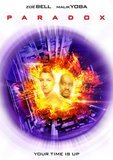 Next up in my Netflix time-travel end-of-the-year marathon: Paradox (2016). I've always said and thought that the best part of time travel is paradox - more specifically, how time travel can take place, notwithstanding the paradoxes that it (especially time travel to the past) inevitably engenders.
Next up in my Netflix time-travel end-of-the-year marathon: Paradox (2016). I've always said and thought that the best part of time travel is paradox - more specifically, how time travel can take place, notwithstanding the paradoxes that it (especially time travel to the past) inevitably engenders.Paradox does a very good job with one of them - what I like to call the where did it come from paradox. In its plain, vanilla form - that is, without any murders or such like - someone knocks on my door, which I (an engineer of some sort) open. He's older than I am, and looks very familiar. He tells me he's me, from the future, with explicit information about how to construct a time machine. I (of course) don't believe him. In particular, he describes things - alloys, media, whatever - that don't exist, as far as I know. He leaves. As the years go by, I keep thinking about this conversation. And I begin to see some of the things he described come to be. Eventually, I build the time machine, and travel back to the past to tell myself how to build it. Neat loop. But ... where did it (the knowledge with which to build a time machine) come from in the first place?
Paradox the movie starts with someone traveling not to the past but just an hour into the future. He's part of a team. He sees just about everyone else on his team dead or wounded in that hour later. He returns to when he started - back an hour into the past - to warn everyone and stop the bloody mayhem. Of course, he doesn't succeed.
The reasons that he doesn't succeed are laced with the where did it come from paradox. Everything is logically spun out and connected across this brief piece of time, with plausible explanations for everything that happens. The movie received some criticism for its sophomoric dialogue and humor, but I had no problem with it, likely because of my low-brow tastes. Nah, I think I have very sophisticated tastes, and people who are put off by low-brow humor just have sticks up their rear-ends.
Ok, you tell me. I liked this line from the movie. One of the characters says, "Hey Jim, remember it's [the time travel process] a black hole. If anything goes wrong, you will literally disappear up your own ass." At least a little funny, right?
If you agree, you'll likely like Paradox (written and directed by Michael Hurst). If not, go watch something like Wormwood.

watch The Chronology Protection Case FREE on Amazon Prime Paul Levinson's books ... Paul Levinson's music
Published on December 21, 2017 23:02
A Tale of Two Tickers
I didn't bother to take photos of this, but I couldn't help notice the slightly different headlines or tickers MSNBC and CNN attached to their coverage of Republicans bowing and scraping around Trump about his "leadership" in getting the destructive new tax bill done:
MSNBC: "GOP lavishes praise on Trump"
CNN: "GOP heaps praise on Trump"
Since when did MSNBC become so genteel? CNN is probably more entitled to be angry at Trump than is MSNBC - after all, CNN was the first to be called out as fake news by Trump bellowing at a news conference, almost a year ago in January 2017 - but I'd give the edge on the more accurate headline to CNN anyway.
I left the TV screen before I had a chance to see how Fox characterized this. Anyone know? Maybe, "GOP gives long overdue praise to President"?.
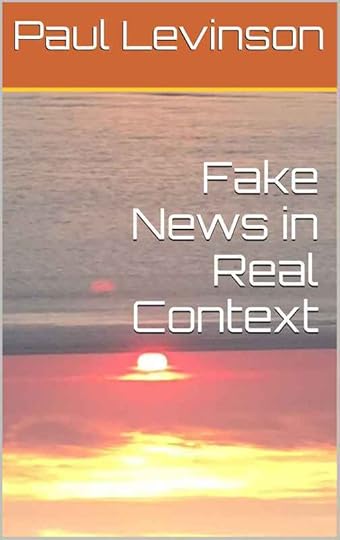
Paul Levinson's books ... Paul Levinson's music
MSNBC: "GOP lavishes praise on Trump"
CNN: "GOP heaps praise on Trump"
Since when did MSNBC become so genteel? CNN is probably more entitled to be angry at Trump than is MSNBC - after all, CNN was the first to be called out as fake news by Trump bellowing at a news conference, almost a year ago in January 2017 - but I'd give the edge on the more accurate headline to CNN anyway.
I left the TV screen before I had a chance to see how Fox characterized this. Anyone know? Maybe, "GOP gives long overdue praise to President"?.

Paul Levinson's books ... Paul Levinson's music
Published on December 21, 2017 10:57
Levinson at Large
At present, I'll be automatically porting over blog posts from my main blog, Paul Levinson's Infinite Regress. These consist of literate (I hope) reviews of mostly television, with some reviews of mov
At present, I'll be automatically porting over blog posts from my main blog, Paul Levinson's Infinite Regress. These consist of literate (I hope) reviews of mostly television, with some reviews of movies, books, music, and discussions of politics and world events mixed in. You'll also find links to my Light On Light Through podcast.
...more
- Paul Levinson's profile
- 342 followers



